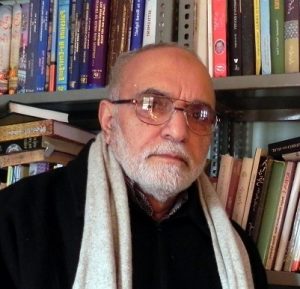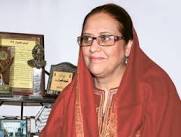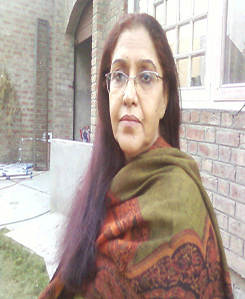Peace Watch » Editor's Take » Koshur Literature And World: Indu Kilam’s Translation of Naseem Shafaie
Koshur Literature And World: Indu Kilam’s Translation of Naseem Shafaie
 PUNCHLINE
PUNCHLINE
Taking ‘Koshur’ Literature To World
Indu Kilam is Trendsetter
By
Z G Muhammad
Some ten years back, I reviewed, ‘Journey into Islam, the Crisis of Globalization’ (2007) the first of series of three books written by Prof Akbar Ahmed, an American scholar seeking to establish a dialogue and understanding between the West and Islam. And to find answers for the hatred and mistrust between Muslims and the West intensified after the September 11- when twin towers in New York had crumbled. The other books in the series include ‘Journey in America’ the Challenges of Islam (2010) and Journey into Europe, Islam, Immigration and Identity (2018)- in this column; I had written about these two books also after they had hit the stands.
His works are “anthropological excursions” and unique blend of travelogue and scholarship. For his first work, Akbar with his team of scholars had travelled ‘from mosques of Damascus to madrassas in Deoband. Going widely in India, and meeting diverse people, he wrote extensively on Aligarh movement, Deoband seminary and the role some of eminent saints and Sufis in Indian society.
Notwithstanding, he and his team staying in India for quite a time they did not visit Kashmir, to know about a 14th-century indigenous movement led by Sheikh Noor-u-Din- a unique combination of spreading the message of Islam, tolerance, mysticism and social and environmental awareness- popularly called ‘Rishi Movement’. Sheikh sees Prophet Mohammad (SAW) as the first Rishi. Trying to answer the poser, why Akbar Ahmed, one of leading anthropologist of the world chose not to explore this genus of Kashmir’s Islamic movement, that loudly spoke of tolerance, brotherhood, amity and peace- ‘forging a sickle out of the sword’. The answer could be that the world is not aware of rishi movement founded by the Sheikh. The fault is not of scholars like Akbar Ahmed but ours. The writers and scholars of the land at no point of time endeavoured to give the world the best translation of the Sheikh poetry or that of the host of Sufi poets that could have enriched mystical literature at the global world. It is a harsh reality that we are yet to realise the importance of translation of works of our poets for making to the world outside know about our history, culture and ethos- that Lal Ded has beautifully summed up, “ Asi aasy tu aasi asu, asav/ Asi dor kar patuvath.” (We have been in the past/In future also shall be ).
Had not Reynold A. Nicholson translated entire Mathnawi of Rumi into English in the first quarter of the twentieth century, perhaps he would not have been as widely known and read in the West as he is today. And his mausoleum in Konya, Turkey would not have become a place of pilgrimage for lovers of literature from across the world. So holds for Omar Khayyam had not Edward FitzGerald, translated his poetry in the mid-nineteenth century, perhaps Rubáiyát Khyam would not have been part of global literature. One, would not find Chilean poet Pablo Neruda, the inspiration for a section youth in our part of the world but his poetry translated into English. Had not writers like Palestinian American poet Fady Joudah, translated works of Mahmoud Darwish from Arabic into English, perhaps he would not have been an inspiration for thousands of youth across the globe fighting for justice and denying to bow before the mighty usurpers. Moreover, he would not have emerged as a global voice of dissent. ‘The Butterfly’s Burden’ that brings the first three volumes of poetry’ published after his 26-year exile made Darwish an eloquent voice of similarly placed people across the world.
Nonetheless, emphasising the need for rendering Koshur literature into English and other modern languages to reach out to the world is not to suggest, we have been entirely barren as far as translations are concerned. Kashmiri short stories have received some attention from translators, Dr Hameedah Nayeem has translated six short stories of Akhtar Mohi-u-Din, Dr. Nusrat Bazaz, of Kashmir University, Dr. Abid, Editor Shiraz of the Cultural Academy, have translated a good number of short stories, Neeraja Mattoo has translation of a selection of short stories of top fiction writers was published in 1993, so had late Mohammad Sidiq Beg done some years back. Similarly, some scholars and Professors, like Shafi Shauq, G.R. Malik, Majrooh Rashid and few others have also rendered some important poem from Koshur into English, published in some literary magazines- more particularly university journals, of course having minimal reach. Nonetheless, there has never been a serious effort to translate Koshur literature into English and other languages, look for an international publisher for them for introducing it at the global level.
 Some days back, it came as glad tidings to me, when a friend presented me a copy ‘Neither Shadow Nor A Reflection’ English rendering of ‘Na Thsay Na Aks” a poetic collection of Naseem Shafaie. On a couple of occasions, I have heard the poet reciting her poems, but have not read her that zealously as one reads ‘major poets. Nonetheless, I admired her diction. So the translation of a collection of the poems which has earned her Sahitya Akademi award, by Indu Kilam was my first exposure to the poet. Indu Kilam in more than one way is a trendsetter, to my knowledge, it is the first collection, translated in its entirety, and rendering into English is so powerful that one does not crave for reading the original.
Some days back, it came as glad tidings to me, when a friend presented me a copy ‘Neither Shadow Nor A Reflection’ English rendering of ‘Na Thsay Na Aks” a poetic collection of Naseem Shafaie. On a couple of occasions, I have heard the poet reciting her poems, but have not read her that zealously as one reads ‘major poets. Nonetheless, I admired her diction. So the translation of a collection of the poems which has earned her Sahitya Akademi award, by Indu Kilam was my first exposure to the poet. Indu Kilam in more than one way is a trendsetter, to my knowledge, it is the first collection, translated in its entirety, and rendering into English is so powerful that one does not crave for reading the original.
Indu Kilam introduces Naseem Shafaie as the poet, ‘who has been able to create a positive feminine identity in all her poems’ and compared her to  Kamala Das, the Malayalam poetess. It cannot be denied, that the elements of gender sensitivity do permeate in some of her poems, but compartmentalizing would be harsh to her- one can hardly think of a poem that is not brimming with pain and agony- every poem is a mirror image that of the times that both the poet and translator have been witness.
Kamala Das, the Malayalam poetess. It cannot be denied, that the elements of gender sensitivity do permeate in some of her poems, but compartmentalizing would be harsh to her- one can hardly think of a poem that is not brimming with pain and agony- every poem is a mirror image that of the times that both the poet and translator have been witness.
The poem ‘a soundless city’ subtly sums up the shocking experiences of living in a stifling atmosphere and the predicament that a whole generation has been undergoing:
“They enquired of her whereabouts
Saying ‘you know, you are aware, this is a soundless city.
There is a ban on joyful chatter. Either be banned or be punished.
Why did you allow her space to build a nest;
Why did you allow her to sing? This is a soundless city. This is soundless city.’
The poem reads like an extract from ‘The Curfew’, a dystopian novel by Jesse Ball,- in the city of “C”, William a violinist is forbidden, along with the rest of the country, to play music. Bidding farewell to music, he becomes an epitaph writer for graves- and remains confined to his house with his mute daughter. The city of “C” can comfortably swap with the City of “S”.
The poem ‘wordless’ painfully portrays the internal suffocation of the poet and just in a line tells a thousand story:
“Lock the lips and bury the treasure of words’.
In the poem ‘The Dialogue Within’, the rebel in the poet finds a bold expression:
“Why can’t you tread the path of storms?
Why are you confined to your
With this deceptive mirror….
Why can’t you experience this storm?
It might be able just to move your head,
But it will be unable to tear it.’
‘The Heart, an inn of Mourning’ is another major poem that depicts agonised scenario the poet is pained at, and the translator has so painstakingly preserved its subtleties that it is hard to believe it is a translation.
“A whimper rose from a mother’s bosom stopped at the lips, stopped the breath and came out singing a wedding song.
“Why so O Bulbul, you look so pale?
Let me shed my blood for you O my loved one.”
The beauty of the collection is, it is wedded to ethos and culture of the land and translator having succeeded in preserving it.
“Tie a wish string to the inner latticed window
Bless me and ask God to
Look after her my only child
Let him continue living long
And no evil eye ever to fall on him
Tears”
Every poem in the collection is so powerful, that it is difficult to say which one is more intimate to our pain and agony, and which one is. The translator has meticulously preserved the nuances and spirit of each poem.
Indu’s translation of Naseem’s collection should inspire more rendition of old and contemporary poetry and fiction, to take our literature to the world.
Filed under: Editor's Take







